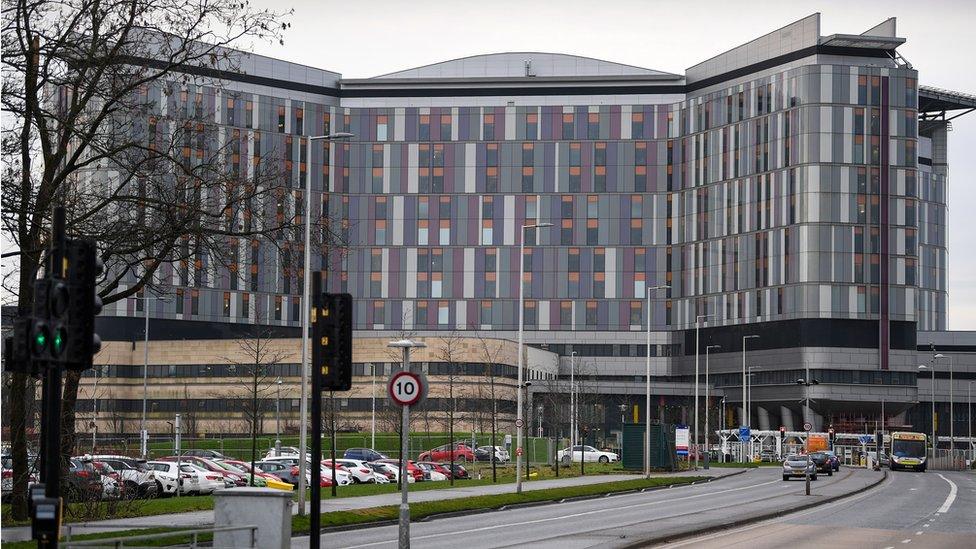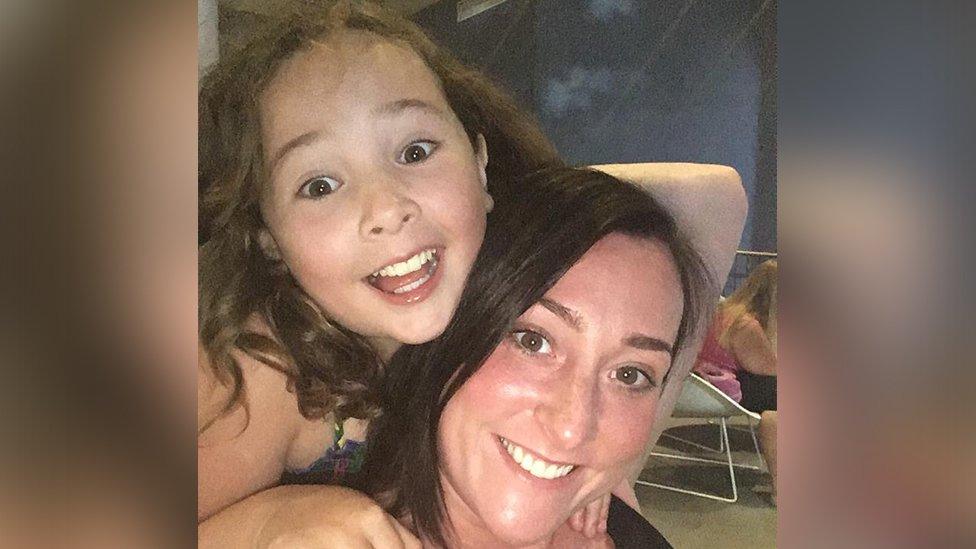Glasgow health board launches legal action over super hospital
- Published

The £800m Queen Elizabeth University Hospital complex in Glasgow opened in 2015
A health board is taking legal action against three companies over "technical issues" with the £800m Queen Elizabeth University Hospital complex in Glasgow.
NHS Greater Glasgow and Clyde has published the summons, external, which seeks to recoup £72.8m in losses and damages.
The legal action follows multiple problems at the QEUH since it opened in 2015, ranging from water contamination to fungal infections.
One of the firms, Multiplex, says it is "extremely disappointed" by the move.
Capita Property and Infrastructure Ltd and Currie and Brown UK Limited have also been served a summons.
It sets out where NHSGGC's requirements were "not met in either design, commissioning or building stages" in 11 specific areas.
These include the water system, ventilation, toughened glazing, doors and an atrium roof.
The campus in the Sheildhall area of Glasgow is the site of both the Queen Elizabeth University Hospital and the Royal Hospital for Children.
NHSGGC chief executive Jane Grant said patient safety was paramount and at high standard at both hospitals.
"Whilst we are now taking legal action on a number of design and installation issues, it is important to stress that the hospitals continue to provide safe and effective care," she added.
Ms Grant said a "significant amount of work" has taken taken place to address issues with the water supply and ventilation.
'Special measures'
She added: "We know that patients, families and staff have been caused concern as the issues have emerged and I am sorry for any distress caused.
"As the matters are now the subject of court proceedings, we are not in a position to comment further."
Multiplex, one of the companies involved in the hospital's construction, said the project was delivered "on time, on budget, and fully certified before its handover" to the board.
It said it was treating the matters raised with "utmost seriousness" and would continue to work "openly, proactively and transparently" with the board.
The legal action comes five months after the Scottish government announced a public inquiry into issues surrounding the Glasgow hospital and Edinburgh's new children's hospital.
It is expected to look at how the design, handover and maintenance contributed to ineffective infection control at the QUEH complex.
Meanwhile in November the health board was placed in "special measures" by the government amid criticism of its infection control procedures.


Milly Main, 10, died at the Royal Hospital for Children on 31 August 2017 after being treated on a ward affected by water contamination
In brief: The trials of Scotland's super hospital
In January 2019 it emerged that two patients at the QEUH had died after contracting a fungal infection linked to pigeon droppings.
In November it came to light that two children who had died in 2017 at the Royal Hospital for Children (RHC), which is part of the complex, were treated on a ward affected by water contamination.
NHS Greater Glasgow and Clyde was placed in "special measures" in the same month following issues over infection prevention, management and control at the hospitals.
In 2017 it was also announced that cladding similar to that used on Grenfell Tower would be replaced, at a cost to the taxpayer of £6m.
The following year a panel fell from the 10th floor of the QEUH, shattering near the front entrance. No-one was injured, but safety netting was erected around the hospital.
Reports claimed panels had fallen from the building on at least three occasions since it opened. The health board said an investigation into what caused the fall was inconclusive.

Last week the death of a child who contracted an infection at the Royal Hospital for Children was referred by the board to prosecutors.
Milly Main, 10, died in August 2017 after treatment for leukaemia.
In response to news of the legal action, Labour MSP Anas Sarwar, who has supported Milly's family, said: "The ultimate responsibility on the design of the hospital campus, the commissioning and the sign-off lies with the health board and the Scottish government.
"Hospital managers knew that the water was contaminated when the building was transferred from the contractor to the health board, and a report the week it opened warned of a high risk of infections.
"This is nothing but gross incompetence on behalf of the health board, which has lost the trust of patients, parents and the public."
The Scottish government said it always expects health boards to take all appropriate measures to safeguard the interests of taxpayers and the public.
A spokesman added: "As the health secretary has made clear in parliament, all families deserve to have confidence that the places where their children are cared for are as safe as possible.
"Significant work, including a public inquiry and an independent review, are under way to address concerns that have been raised about the QEUH."

Mason Djemat pictured in the Royal Hospital for Children, just hours before he died on 9 August 2017
Last year the mother of a boy who died in the RHC weeks before Milly claimed she was ignored by the health board and the Scottish government.
Mason Djemat, three, was a patient on a ward which was affected by water contamination.
Jeane Freeman, Scotland's health secretary, and NHSGGC has apologised to the parents of both children for the board's handling of the deaths.
- Published20 December 2019

- Published17 December 2019
